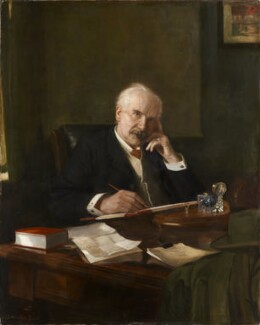
July 15, 2020, by jicke
From natural pest control to cancer research – celebrating 100 years of the Sir Jesse Boot Chair of Organic Chemistry.
This year marks the 100th anniversary of the Sir Jesse Boot Chair of Organic Chemistry and during that time the post has helped the University become a leading innovator in the field of organic chemistry.
Professor Neil Thomas takes a look at the history and achievements of the Chair and what the future may hold:
“The century covered by the Sir Jesse Boot Chair in Organic Chemistry has seen an enormous expansion in the School of Chemistry at the University of Nottingham, going from 8 academic staff and around 40 full and part-time students in 1920, to 50 academic staff and more than 800 fulltime undergraduate and postgraduate students and postdoctoral researchers in 2020.
From a small laboratory in the Arkwright building in Nottingham city centre, chemical research is now carried out in 3 buildings including the state-of-the-art Carbon Neutral Laboratory on the Jubilee Campus and at the newly expanded Biodiscovery institute on University Park. Teaching chemistry has developed internationally in the last 5 years to include a BSc in Chemistry jointly taught at the University of Nottingham, Ningbo, China campus and an apprenticeship scheme with participants from companies across the UK.
There have been seven holders of the Chair since it was created through an endowment from Sir Jesse Boot (later 1stBaron Trent) given to the University on 15th July 1920: Frederic S. Kipping FRS (who held the Chair from 1920-1936) ), John Masson Gulland FRS (1937-1947), Frederick E. King FRS (1948-1955), Alan W. Johnson FRS (1955-1968), Leslie Crombie FRS (1969-1988), Gerald Pattenden FRS (1988-2005-) and Chris Moody (2005-present).
The current Sir Jesse Boot Professor, Chris Moody is stepping down in September 2020 and the search for the next occupant of this important and prestigious chair in Organic Chemistry and its interface with Biology and Medicine will begin.
Putting Nottingham Chemistry on the map
As the 1st World War ended in November 1918, large numbers of servicemen returned to Nottingham, with between 40 and 50 wanting to be trained for new careers in Chemistry at University College Nottingham. At that time, the University College was based in Nottingham City centre within the Arkwright and adjacent buildings on Shakespeare Street, sandwiched between the City Library and City Museum, where it had been established in 1881 with Frank Clowes as one of the four founding Professors. The immediate space pressures caused by this influx of students were overcome by clearing out one of the large rooms of the museum of its stuffed animals (the surviving part of the collection now forms the Natural History collection at Wollaton Hall) and converting it into an elementary laboratory with 70 bench spaces for both full and part time students.
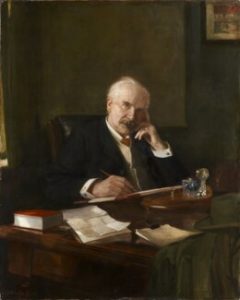 To allow the University to expand from its site in the city centre Sir Jesse Boot was approached to see if he would be able to help fund expansion. He was very ill at the time with arthritis and did not respond until 2 March 1920 at which time he indicated that he was unsure if he would be able to help. However later that year the sale of Boots to an American drug company gave him the funds to help and on July 15 July 1920 he wrote to the Aldermen again, sending them a cheque for £50,000, of which £30,000 was for the University College building fund and £20,000 (equivalent to £600,000 in 2020) for the foundation and endowment of a Chair of Chemistry to promote chemical research.
To allow the University to expand from its site in the city centre Sir Jesse Boot was approached to see if he would be able to help fund expansion. He was very ill at the time with arthritis and did not respond until 2 March 1920 at which time he indicated that he was unsure if he would be able to help. However later that year the sale of Boots to an American drug company gave him the funds to help and on July 15 July 1920 he wrote to the Aldermen again, sending them a cheque for £50,000, of which £30,000 was for the University College building fund and £20,000 (equivalent to £600,000 in 2020) for the foundation and endowment of a Chair of Chemistry to promote chemical research.
The holders of the Sir Jesse Boot Chair of Organic Chemistry have helped the University of Nottingham gain an international reputation in Organic and especially Natural Products Chemistry. More recently their contributions to the area of sustainable chemistry has resulted in the creation of the part GlaxoSmithKline (GSK)-funded Carbon Neutral Laboratory and the Centre for Green and Sustainable Chemistry. This research includes the exploration of the use of alginic acids to prepare weather resistant fibres conducted by John Masson Gulland that led to the formation of the Scottish Seaweed Research Association, Frederick King’s later work with British Petroleum (BP) protein that brought Toprina, a yeast product made by a Candida lipolytica strain grown on oil derived long chain n-alkanes, Alan W. Johnson’s work on insect pheromones as natural methods for pest control, and Leslie Crombie’s studies on the use of pyrethins as natural insecticides and rotenone in agriculture and more recently in horticulture as a ‘green’ insecticide for clearing waters used in fish farming, prior to restocking.
Gerry Pattenden’s research investigated new synthetic methods, and the development of novel strategies for the total synthesis of natural and non-natural target molecules of medicinal, and more general industrial importance. These target molecules display profoundly important biological properties, e.g. anti-tumoral, anti-allergic, insecticidal, anti-fungal, immunoregulatory, anti-hypertensive, of interest to today’s pharmaceuticals, and agro chemicals industries.Gerry also initiated the building on the Centre for Biomolecular Sciences, which opened its first phase in 2003. This was the first multidisciplinary academic centre dedicated to this area of research to open in the UK. It has recently been extended and rebranded as the Biodiscovery Institute which has a suite of buildings to house nearly 1,000 staff dedicated to multidisciplinary research at the interfaces between biology, chemistry, pharmacy, human and veterinary medicine.
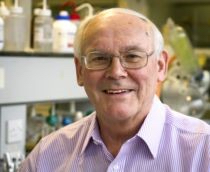 Gerry said: “The Sir Jesse Boot Chair has become one of the most revered, named, Chairs of Organic Chemistry in the UK since its inception in 1920. Successive holders of the Chair have each established international reputations for their research studies of various aspects of Natural Products Chemistry, which have been instrumental in maintaining the high esteem enjoyed by the School of Chemistry in Nottingham.”
Gerry said: “The Sir Jesse Boot Chair has become one of the most revered, named, Chairs of Organic Chemistry in the UK since its inception in 1920. Successive holders of the Chair have each established international reputations for their research studies of various aspects of Natural Products Chemistry, which have been instrumental in maintaining the high esteem enjoyed by the School of Chemistry in Nottingham.”
Looking to the future
Current Chair, Professor Chris Moody has continued the tradition of natural product synthesis, in particular thiopeptide antibiotics, and in common with Gerry Pattenden, a strong interest in the polyazole natural products. More recently Chris’s research has focused on the interface with medicine with synthetic organic chemistry projects to generate new molecules for use in cancer, neurodegenerative and respiratory diseases.
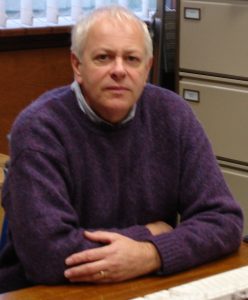 Professor Moody commented: “In my 15 years in Nottingham, I am pleased that I have been able to contribute to our knowledge of organic chemistry and continue the Nottingham tradition of research on bioactive natural products. I sincerely hope that once the coronavirus crisis has subsided, the University will be able to make a new appointment to this important and prestigious chair in Organic Chemistry.”
Professor Moody commented: “In my 15 years in Nottingham, I am pleased that I have been able to contribute to our knowledge of organic chemistry and continue the Nottingham tradition of research on bioactive natural products. I sincerely hope that once the coronavirus crisis has subsided, the University will be able to make a new appointment to this important and prestigious chair in Organic Chemistry.”
To read the full story of the Jesse Boot Chair written by Professor Neil Thomas go to: https://www.nottingham.ac.uk/chemistry/
No comments yet, fill out a comment to be the first

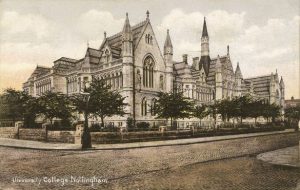
Leave a Reply